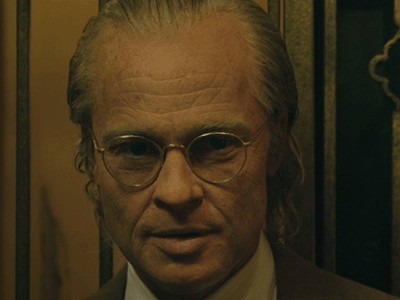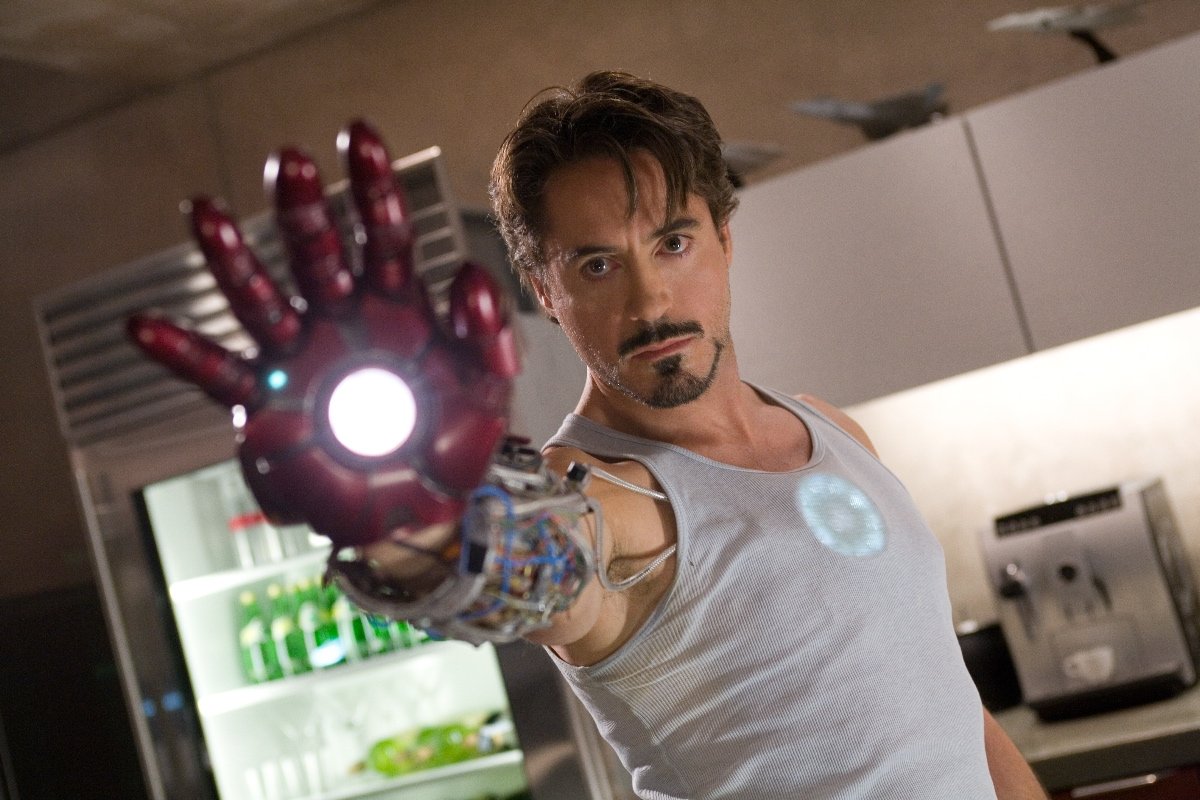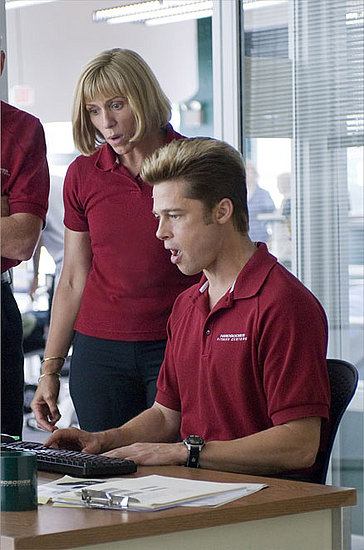
The pitch for Benjamin Button must have gone like this: imagine the elderly Rose from
Titanic remembering the romance of her life, only instead of a sinking ship, the story she tells is
Forest Gump. In quasi-reverse.

For that's basically the setup for this Hollywood tear-jerker told in the best cinematic race-for-the-Oscar's fashion. Every year we're owed one of these big, special-effects, poignant Hollywood romances: if it's not
Forest Gump in 1994 or
Titanic in 1997, then it's
The Aviator in 2004 or
Atonement in 2007. They all have four basic things in common: big Hollywood names, sweeping historical recreations, heartbreaking romance, and attention-grabbing special effects at their core.
Not being a big fan of Hollywood's schmaltzy side and certainly only quasi-impressed with
Forest Gump or
Titanic, I must say that
The Curious Case of Benjamin Button is one of the best of the lot of this sort of thing. It will certainly be all over this year's Oscar list, being a shoe-in for well-deserved nominations for makeup, effects, and art direction, as well as doubtlessly laying claim to a few of the bigger noms such as possibly for movie, screenplay, direction, and acting. This is the kind of movie that Oscar loves - or used to love, at any rate - and this one doesn't disappoint.
Let's start off with that special effect.
Gump had its groundbreaking rotoscoping into historical footage (soon to become commercially commonplace).
Titanic had its sinking ship;
Atonement its impossibly long take of the invasion at Normandy.
Benjamin Button is most like
Titanic in that its special effect, the amazing aging and youthing of actor Brad Pitt, itself becomes a kind of central character in the film, one that plays an essential role in the story. Each scene in which Benjamin appears you are riveted looking at him and trying to figure out how they did that. And also, in each scene, you know something the other characters may or may not: which is that Benjamin's appearance and his chronological age are at odds (except, of course, when they meet, in the middle), and so the poignancy of his interactions: his first job, his first drink, his first love - are heightened by Benjamin's curse of being so ripped out of time. The amazing pleasure of this movie is watching how the characters interact with an old man who's actually quite young...or vice versa (though there's less of the vice versa than I'd hoped), and Fincher does an excellent job of mining cinematic gold out of Benjamin's strange and oddly affecting interactions with the people who enter and leave his life.
Because Benjamin is aging backwards, he is born into something most of us would rather not think too much about: the end of life. So he begins his life befriending people who are soon to leave this world. Fincher's story then amplifies the sorrow of loss through the lens of a man whose backward trajectory through life intensifies and quickens that experience, and you'll be excused the several occasions when you find your self brushing away a tear. Fincher - the director of the horror thriller
Seven and the testosteronic
Fight Club, as well as the underappreciated serial-killer mystery
Zodiac - is a director not known for sentimentality. And perhaps that's what makes him the right man to handle this material; for in another director's hands (I think, perhaps, Speilberg or Zemeckis) this stuff would easily become maudlin pap. Fincher however provides us with what I think has to be one of the most realistic portrayals of aging, dying and loss in movies. After all, the appearance (or disappearance) of wrinkles and the gaining and loss of physical ability is what this movie is about, and in Eric Roth's screenplay you have the feeling you're in the hands of someone who intimately understands the complex emotions at the loss of a parent or the breakup of a marriage. By keeping things matter-of-fact and not shying away from the needles, nurses, and infirmities that accompany the end of life, Fincher's story gains the power it has. And when our hero, Benjamin, inevitably dies - in a way that I'm sure most of you who haven't seen the film must wonder about and that fits plausibly into the story's unique logic - you can't help but marvel at how, by simply reversing it's order, this story effectively highlights the strange and terrifying experience that is human life.
So much for the special effect. Let's turn next to the history. Fincher does an excellent job evoking the time and place he wants: 1920's New Orleans, 1930's Russia, 1960's suburbia, or humorous flashbacks of a man struck repeatedly by lightening during his life in the 1800's, by repeating the techniques that worked so well for him in creating 1970's San Francisco in
Zodiac: focusing on important research into the nostalgic details of a few key sets (the paper sleeve of an album, the furnishings of a hotel) and adjusting his lighting and camera work not with the sepia tones of our present-day photographs (except where that works to highlight the humor of the flashbacks) but with a bright-as-day photography of the well-researched art direction into the actual popular colors, fabrics, and fashions of the times. We have gotten used to the stacked movie set filmed in brown tones and know that that's "cue" for nostalgia. Fincher's work is different: we feel we're actually seeing what people alive in 1920's must have seen with their own eyes, not in our photographs, and he punctuates the progress of history with just the right selection of historical background music. This is key to the magic of Fincher's reverse story-line through life as he takes us up to the present day.

And speaking of present day, this again features what at first seems a very odd but ultimately interesting choice: the moment in 2005 when hurricane Katrina is about to slam into New Orleans. That is until you look back on the movie and realize that Fincher's film is a memorial in a very different way. It's a memorial to New Orleans itself, and the people and city lost in that hurricane. (Fincher makes great effect of the metaphors of wheels spinning in reverse - from clocks to carousels to the hurricane itself - to tie all this together). If nothing else, then, Benjamin Button is the most original and moving memorial to the untimely death of an American city that I've ever seen.
Then there's the third facet of these sorts of film: the stars. Some
unscientific web voting has that Brad Pitt is s shoe-in for an Oscar nomination. Others feel he'll
invariably be snubbed. I myself fall into the shoe-in category, for I think Pitt here gives the best performance of his career in a role that is multiply challenging to say the least. And don't be surprised if Taraja P. Henson as Benjamin's adopted mother receives a nom for supporting actress. Both actors do a great job acting their way across the range of years (though Pitt's is the more believable). And even though Cate Blanchett as the elderly Daisy has to carry the film through a mask of makeup, in her role as the younger Daisy I found her uncharacteristically disappointing. Daisy - Benjamin's great love - is a dancer, but Blanchett's cool demeanor and youthful folly seem strangely artificial, as if Blanchett didn't quite find the right pose for the strange reality of this backwards story. Which is so odd given how good she usually is.
But maybe it's not entirely her fault, and here I arrive at the last pillar of the Hollywood tear-jerker, the love story. This pillar of
Button is the weakest of the four, as I find the romance between Benjamin and Daisy to be rather ordinary. It is precisely when the two characters meet in the middle - when they, for a brief moment in time, become an ordinary couple savoring the ordinary and all the more fleeting pleasure of life - that the film loses momentum and originality. Not that it isn't surrounded by originality, and not that we soon don't give way to the inevitable consequence of two people moving in opposite directions through time. But at the very center of
Benjamin Button, when we should be finding what's miraculous about life, we find a kind of short montage of coupledom that might be mistaken for a Tide commercial. That may be overly harsh, for there are of course more profound problems hanging over their heads, and in a story of nostalgia, happiness does make for the least interesting memories. But this intersection in the characters' archs doesn't quite meet for me in a way that could bring more of everything in the film together...and so when they part again, it feels we have missed something, and we can't quite put our fingers on what. As Benjamin goes world-weary and wise into his young age, we get a kind of Brad Pitt
Seven Years in Tibet retrospective rather than what we would have expected: an insight into that old wish to have the wisdom of age and beauty of youth. But those potential intriguing incidents are oddly quickly skipped over, and even though this film at three hours is already longer than it needs to be, those are the incidents I miss.
But Fincher's last moments of the film - his poignant tribute to the characters in Benjamin's life - is beautiful, heartrenching, and exactly right - so he makes up for it. What he's got here is a film that personally touches you, that salutes your life, as well as the life of a city. I went along with it, all in. For a Hollywood tear-jerker to touch me like that really is an achievement, so even though it has the innevitable touch of schmaltz - and even though its three hour playing time drags out a bit too much - this is the Oscar season movie that doubtlessly everyone will be talking about.
 The title of the movie is Frost / Nixon with a slash...but it should be Frost v. Nixon - as in an HBO boxing special. For the boxing metaphor is the central organizing principle that Peter Morgan has set up in his play about TV Host David Frost's first public interview after Nixon's impeachment.
The title of the movie is Frost / Nixon with a slash...but it should be Frost v. Nixon - as in an HBO boxing special. For the boxing metaphor is the central organizing principle that Peter Morgan has set up in his play about TV Host David Frost's first public interview after Nixon's impeachment.
























